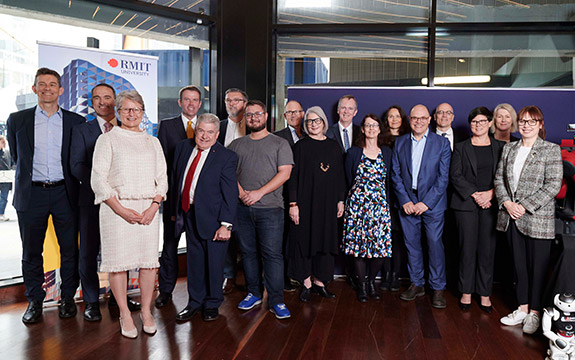Swinburne joins ARC centre to explore safe use of decision-making technologies

In Summary
- Swinburne will play a key role in the ARC Centre of Excellence for Automated Decision-Making and Society
- The research centre will focus on ensuring emerging autonomous decision-making technologies are used safely and ethically
- Director of Swinburne’s Data Science Research Institute, Professor Timos Sellis, and Dean of Swinburne Law School, Professor Dan Hunter, are two of centre’s chief investigators
Swinburne is a key player in a new Australian Research Council (ARC) centre examining the use of autonomous decision-making technologies that increasingly make decisions, choose actions and determine outcomes across industries such as healthcare, social services, transport and media.
Director of Swinburne's Data Science Research Institute, Professor Timos Sellis, and Dean of Swinburne Law School, Professor Dan Hunter, will each co-lead one of the four research programs that focus on the safe, ethical and responsible use of decision-making technologies.
Minister for Education Dan Tehan this week announced $31.8 million in government funding to launch the ARC Centre of Excellence for Automated Decision-Making and Society, which will be hosted at RMIT University in Melbourne.
Researchers for the new centre will formulate world-leading policy and practice in responsible use of autonomous decision-making technologies, enhance public understanding of these technologies and train researchers and practitioners in this new field, which is creating both opportunities and risks.
Seizing opportunities and mitigating risks
From artificial intelligence to blockchain, automated systems offer enormous benefits across many industries.
Minister Tehan says automated decision-making technology is being used in self-driving cars and in algorithms to make medical diagnoses and business decisions.
“This technology has great potential to transform the efficiency of industry, as well as public and private services. However, as with all technology, it is prudent to explore how to mitigate any potential risks,” he says.
The ARC centre aims to reduce risks in the development and implementation of automated decision-making. These risks include the privacy, security and welfare of citizens and consumers, as well as potential harms including data discrimination against disadvantaged communities or illicit exploitation of personal information for political and commercial ends.
Swinburne’s chief investigators
Director of Swinburne’s Data Science Research Institute, Professor Timos Sellis, will co-lead one of the four research programs, focusing on the effective and efficient use of data in automated decision-making.
Professor Sellis’ specific research will address how systems that support data management, sharing and analysis are augmented with built-in support for fairness, accountability and transparency.
Dean of Swinburne Law School, Professor Dan Hunter, will co-lead the Machines Research Program, focusing on how machine learning technology can be ethically designed, as machines increasingly make choices and predictions that may have far-reaching consequences for humans. This builds on his research about using AI technology to make criminal sentencing fairer. Professor Hunter will coordinate the centre’s research training program, chairing the Research Training and Career Development Committee.
The centre brings together researchers from eight Australian universities and 22 academic and industry partner organisations from Australia, Europe, Asia and the United States. Together, they will provide an additional $39.3 million in cash and in-kind support to the centre, including access to state-of-the-art facilities, systems and research expertise.

